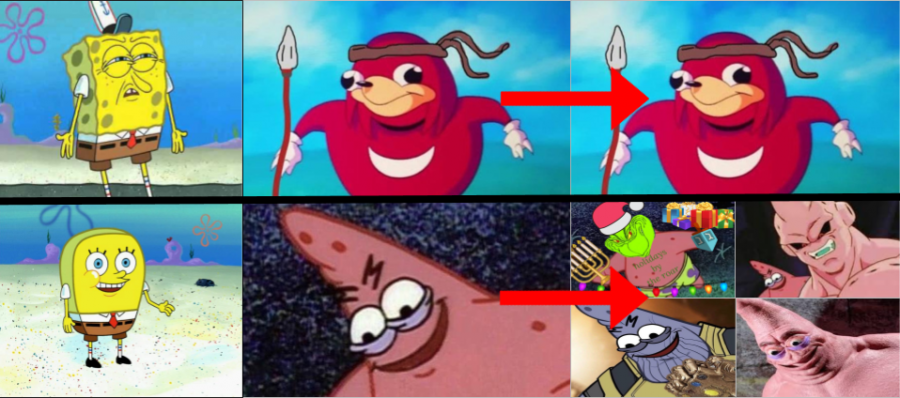OPINION: Meme culture is declining as the internet is growing
The variety of “Ugandan Knuckles” compared to the versatility of Spongebob memes.
Whether it is about a Cincinnati Zoo gorilla or a pair of white shoes, there is nothing worse on the internet than a meme that has gone stale in mainstream media. Though somewhat ignored and overlooked, this trend has become worryingly prevalent, with most memes nowadays keeping their comedic value for only a few weeks, some a few months. This degradation of meme culture, however, is not the fault of the content itself but, rather, of the internet and its large number of users who will deplete a joke until it is no longer humorous.
Most people can agree, for example, that “Ugandan Knuckles” – a joke concerning a deformed version of a character from the Sonic franchise – became vastly unfunny after its rapid ascent to glory near the end of 2017. Correspondingly, statistics from Google Trends show that during the period of January 2018 to March 2018 alone, the meme dropped from a search rating of 100 to 22, 100 being its peak popularity.
As for why this happened, it was ultimately due to the ludicrous extent that Ugandan Knuckles was circulated by internet users. Quickly plastered all over the front pages of YouTube and Instagram, the joke became banal, and it is almost shocking to recall that the meme, according to the subReddit Meme Economy, was at one point “A-tier.” Simply put, as people began to worship the Sonic icon in almost cult-like fashion, repeatedly chanting phrases such as “Do you know the way?” and “Fake Queen,” the meme quickly lost all of its originality and freshness.
Of course, one could argue that this is just the situation for most all internet content – a meme transcends the ordinary into greatness and then fades away after living in the spotlight for a short time. Perhaps, it could be said that it was simply Ugandan Knuckle’s time to go. Yet, a gag’s existence does not have to play out in such a way, a concept which has been proven time and time again by the continuity of the “memeification” of Spongebob Squarepants.
Iconic meme formats such as “Savage Patrick,” “Confused Mr. Krabs” and “Handsome Squidward,” for instance, are arguably some of the internet’s most recognizable, despite how long ago their corresponding episodes were first televised. The reason: though these memes are popular, they only appear when necessary, or when something new can be added to allow for a sense of novelty.
In contrast, all the top search results on YouTube for Ugandan Knuckles seem to be almost direct copies of one another, very rarely has a Spongebob meme remained funny after being used in the same way multiple times. The Spongebob series is able to retain its status as legendary in the meme community not just for its humor, but because it has been reincarnated throughout the years, taking on multiple forms.
With fans of the series being in a constant state of development for new formats and applications, it is not surprising that the phrase “Spongebob Memes” still maintains an excellent search value of about 90 on Google Trends – something that cannot be said for more recent content, which has been ruined by ignorant overuse.
The internet and its population of meme connoisseurs, subsequently, must learn to better appreciate humorous material by using it respectfully and in non-repetitive ways. As Spongebob has shown the world, it has been done in the past and, if the novelty meme culture is to be saved, it must be done now.


